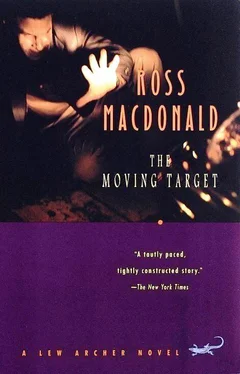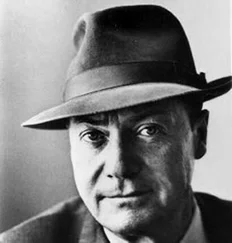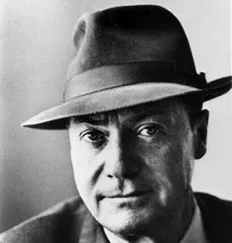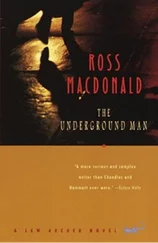The bedroom next to the bathroom was flowered and prettied in pink like a prewar sentimental hope. There was a book on the stars on the bedside table. The clothes in the closet were women’s, and there were a great many of them, with Saks and Magnin labels. The undergarments and night-clothes in the chest of drawers were peach and baby blue and black lace.
I looked under the twisted mass of stockings in the second drawer and found the core of strangeness in the house. It was a row of narrow packages held together with elastic bands. The packages contained money, all in bills, ones and fives and tens. Most of the bills were old and greasy. If all the packages assayed like the one I examined, the bottom of the drawer was lined with eight or ten thousand dollars.
I sat on my heels and looked at all that money. A bedroom drawer was hardly a good place to keep it. But it was safer than a bank for people who couldn’t declare their income.
The burring ring of a telephone cut the silence like a dentist’s drill. It struck a nerve, and I jumped. But I shut the drawer before I went into the hall where the telephone was. There was no sound from the woman in the living-room.
I muffled my voice with my tie. “Hello.”
“Mr. Troy?” It was a woman.
“Yes.”
“Is Fay there?” Her speech was rapid and clipped. “This is Betty.”
“No.”
“Listen, Mr. Troy. Fay was fried in the Valerio about an hour ago. The man she was with could be plain-clothes. He said he was taking her home. You wouldn’t want him around when the truck goes through. And you know Fay when she’s oiled.”
“Yes,” I said, and risked: “Where are you now?”
“The Piano, of course.”
“Is Ralph Sampson there?”
Her answer was a hiccup of surprise. She was silent for a moment. At the other end of the line I could hear the murmur of people, the clatter of dishes. Probably a restaurant.
She recovered her voice: “Why ask me? I haven’t seen him lately?”
“Where is he?”
“I don’t know. Who is this talking? Mr. Troy?”
“Yes. I’ll attend to Fay.” I hung up.
The knob of the front door rattled slightly behind me. I froze with my hand on the telephone and watched the cut-glass knob as it slowly rotated, sparking in the light from the living-room. The door swung open suddenly, and a man in a light topcoat stood in the opening. His silver head was hatless. He stepped inside like an actor coming on stage, shutting the door neatly with his left hand. His right hand was in the pocket of the topcoat. The pocket was pointed at me.
I faced him. “Who are you?”
“I know it isn’t polite to answer one question with another.” His voice was softened by a trace of south-of-England accent a long way from home. “But who are you?”
“If this is a stickup...”
The weight in his pocket nodded at me dumbly. He became more peremptory. “I asked you a simple question, old chap. Give me a simple answer.”
“The name is Archer,” I said. “Do you use bluing when you wash your hair? I had an aunt who said it was very effective.”
His face didn’t change. He showed his anger by speaking more precisely. “I dislike superfluous violence. Please don’t make it necessary.”
I could look down on the top of his head, see the scalp shining through the carefully parted hair. “You terrify me,” I said. “An Italianate Englishman is a devil incarnate.”
But the gun in his pocket was a small, intense refrigerating unit cooling off the hallway. His eyes had already turned to ice.
“And what do you do for a living, Mr. Archer?”
“I sell insurance. My hobby is stooging for gunmen.” I reached for my wallet to show him my “insurance of all descriptions” card.
“No, keep your hands where I can see them. And guard your tongue, won’t you?”
“Gladly. Don’t expect me to sell you insurance. You’re not a good risk, toting a gun in L. A.”
The words went over his head and left it unruffled. “What are you doing here, Mr. Archer?”
“I brought Fay home.”
“Are you a friend of hers?”
“Apparently. Are you?”
“I’ll ask the questions. What do you plan to do next?”
“I was just going to call a taxi and go home.”
“Perhaps you had better do that now,” he said.
I picked up the receiver and called a Yellow Cab. He moved toward me lightly. His left hand palpated my chest and armpits, moved down my flanks and hips. I was glad I’d left my gun in the car, but I hated to be touched by him. His hands were epicene.
He stepped back and showed me his gun, a nickel-plated revolver, .32 or .38 caliber. I was calculating my chances of kicking him off balance and taking it.
His body stiffened slightly, and the gun came into focus like an eye. “No,” he said. “I’m a quick shot, Mr. Archer. You’d stand no chance at all. Now turn around.”
I turned. He jammed the gun into my back above the kidneys. “Into the bedroom.”
He marched me into the lighted bedroom and turned me to face the door. I heard his quick feet cross the room, a drawer open and shut. The gun came back to my kidneys.
“What were you doing in here?”
“I wasn’t in here. Fay turned on the light.”
“Where is she now?”
“In the front room.”
He walked me into the room where Mrs. Estabrook was lying, bidden by the back of the chesterfield. She had sunk into a stuporous sleep that resembled death. Her mouth was open, but she was no longer snoring. One of her arms hung down to the floor like an overfed white snake.
He looked at her with contempt, the contempt that silver might feel for sodden flesh.
“She never could hold her liquor.”
“We were pub-crawling,” I said. “We had a wizard do.”
He looked at me sharply. “Evidently. Now why should you be interested in a bag of worms like this?”
“You’re talking about the woman I love.”
“My wife.” A slight twitch of his nostrils proved that his face could move.
“Really?”
“I’m not a jealous man, Mr. Archer, but I must warn you to keep away from her. She has her own small circle of associates, and you simply wouldn’t fit in. Fay’s very tolerant, of course. I am less tolerant. Some of her associates aren’t tolerant in the least.”
“Are they all as wordy as you?”
He showed his small, regular teeth and subtly changed his posture. His torso leaned, and his head leaned sideways with it, glinting in the light. He was an obscene shape, a vicious boy alert and eager behind an old man’s mask. The gun twirled on his finger like a silver wheel and came to rest pointed at my heart. “They have other ways of expressing themselves. Do I make myself clear?”
“The idea is a simple one to grasp.” The sweat was cold on my back.
A car honked in the street. He went to the door and held it open for me. It was warmer outside.
“I’m glad I called in,” the driver said. “Saves me a dry run. I had a long haul out to Malibu. Four pigs called out to a beach party. They’ll never get near the water.” The back of the cab still had a hothouse odor. “You should of heard those women talk.” He slowed for the stop sign at Sunset. “Going back to town?”
“Wait a minute.” He stopped. “Do you know of a place called the Piano?”
“The Wild Piano?” he said. “In West Hollywood. Sort of a bottle joint.”
“Who runs it?”
“They never showed me their books,” he said airily, shifting into gear. “You want to go there?”
“Why not?” I said. “The night is young.”
I was lying. The night was old and chilly, with a slow heartbeat. The tires whined like starved cats on the fog-sprinkled black-top. The neons along the Strip glared with insomnia.
Читать дальше












